May - June 2017
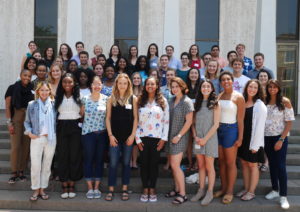
2017-18 Fellows at Princeton in Africa Orientation!
Dear Friends,
The placement process is now complete and we would like to welcome our 2017-18 fellowship class! This year’s fellowship class consists of 48 Fellows, who will be working with 31 organizations in 13 countries across the African continent.
June has been a month of reflecting on PiAf’s past and welcoming the future! Earlier this month, we celebrated with PiAf alumni and friends during Princeton Reunions Weekend. The weekend after Reunions, we joined together with the 2017-18 fellowship class for the Princeton in Africa Orientation on Princeton’s campus. Check out pictures from orientation on our Facebook Page!
This issue of the Fellows Flyer includes an article about Alumni Emily Moder, 2013-14 Fellow with access:energy in Kenya, by SteamaCo’s CEO & Co-Founder Harrison Leaf. Harrison discusses how Emily’s fellowship with access:energy played an important role to the growth of SteamaCo.
We hope you enjoy this edition of the Fellows Flyer!
Warm regards,
Jodianna Ringel
Executive Director
PiAf Connections
Please click below to check out pictures of our Fellows, Alums and other members of the PiAf family meeting up at home and around Africa.
Notes from the Field
By Camille Allamel, 2016-17 Fellow with International Rescue Committee in Kenya
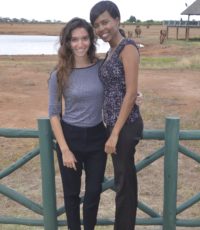
Camille with a coworker at a training for government security officials on forced migrants’ rights, hosted by the IRC.
Headlines this year have been populated by an endless stream of controversies and emergencies affecting refugees in Kenya. Forced migration patterns have grown increasingly complex, due to rapid influxes and contentious outflows in the country, juxtaposed with the protracted state of limbo of those having resided for years in the country’s camps.
The news this year has featured the Government of Kenya’s decision to close Dadaab camp and repatriate its Somali population, Trump’s travel ban affecting the resettlement process of Somali refugees in Kenya, the soaring numbers of South Sudanese refugees coming to seek protection in Kenya, and a drought emergency affecting all of East Africa and amplifying trends in displacement.
Needless to say, the environment within which actors have had to advocate and operate for refugee assistance and protection has been charged and controversial. My participation in IRC’s durable solutions programs and protection/policy work has allowed me to witness the debates generating these headlines first hand. This has included challenges between government security officials and pro bono lawyers, between humanitarian workers and human rights activists, and between refugee leaders and police officers, amongst others.
Currently, at the registration centers on the South Sudan border, one can see hundreds of people being brought to the camps in trucks to formally register for status a few times a week–individuals lost within the masses of new arrivals. While South Sudanese receive prima facie status, thousands of asylum seekers in Kenya wait years to gain refugee status. During home visit interviews in Nairobi settlements, it is common to hear of arbitrary arrests and mistreatment by police officers, as an afterthought to stories justifying flight from one’s country of origin. These instances in the field epitomize the trends in challenges to forced migration mentioned in the headlines above, but these narratives regarding state bureaucracy as well as confrontation with security do not give a full story of migrants’ identities in flux. With resettlement initiatives to third countries stalled, repatriation to countries of origin unsafe for most, and local integration laden with difficulties–these political challenges make headlines, while the culture around movement and the stories of those arriving from an array of countries to Kenya get lost.
Despite state boundaries’ attempts at fixing identities, this year has truly made me appreciate the fluidity of culture and belonging. Beyond the stories of plight from violence and war, the many cultures I have interacted with in Nairobi are what have stuck with me most and what challenge us all to empathize with those we do not know. Conversations about different interpretations of the origin of mankind, about why certain communities engage in bride prices while others pay dowries, about the history of local languages in different areas, have shown me the multicultural nature of the camps. One can find the entirety of the East and Horn of Africa and Great Lakes region in Nairobi or in Kakuma. These new homes contribute to cultures in flux and to the culture of international migration in a complex ethnoscape of identities.
Notes from the Field
By Elizabeth DeFreest, 2016-17 Fellow with Soko in Kenya
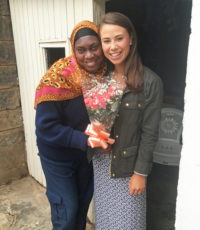
Elizabeth with Asha on her Birthday, beginning the first of many surprises.
Always the first to arrive and the last to leave the office, Asha wakes up at 4:00am to prepare herself for a security day shift and her five children for school. Despite hard work in almost every aspect of life, she has become a support system I would have never anticipated during my first days at Soko. Asha is my role model who symbolizes the positives of Kenya when inefficiency, shortcomings in the workplace and cultural frustrations are often woven into daily life. She has taught me that the simplest lessons are too easily taken for granted.
Falling asleep each night in Nairobi, I find myself amazed by how many lessons, both large and small, I have learned about myself, Kenya, development, humanity, inequality, business, culture and behavior. I have grown thankful for the people who have walked into my life over the past seven months, especially Asha, in addition to the opportunity to expand my exposure and experiences, not always an opportunity I was presented with during my time in Washington D.C.
Despite social, cultural and religious barriers, Asha has beaten all odds and managed to make her way into a male dominated field of employment where she has worked as a security officer for three years. Almost seamlessly, she seems to juggle her work and family life with a smile on her face, even as a single mother of five. Welcoming me into her home on Sundays, I have learned about Islam, life in Africa’s largest urban slum and Kenyan tribalism. We have also watched silly films and shared food from opposite parts of the world.
Asha first helped me learn that Nairobi is a hub for economic opportunity and the city is comprised of international entrepreneurs, a quickly growing Kenyan middle class, individuals from rural areas who arrive in Nairobi to take advantage of economic gain and thousands of others in-between. Most weekends, I spend mornings in Kibera and by night am surrounded by some of Nairobi’s most elite, passing informal settlements in an Uber on my way to dinner where rooms can be rented for $25 a month, shadowed by towering office buildings boasting international logos.
If there is one person in Kenya who I have grown most thankful for, it is Asha. She has helped me through a constant battle between contributing to Nairobi’s inequality, my daily efforts to tighten the gaps, missing home and simplicity. Most importantly, Asha has helped me experience every day to the fullest while valuing the small lessons in life about patience, trust and myself.
Notes from the Field
By Emily Hansman, 2016-17 Fellow with Hope Through Health in Togo
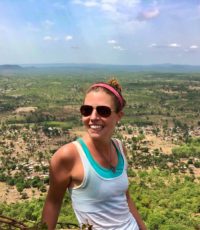
Emily at the end of a hike, overlooking one of the villages served by Hope Through Health.
“What is Togo?” That’s what the Apple employee asked me as I tried to explain why I needed my computer reverted to an earlier operating system to have internet for the next year. He was skeptical. Both of my request and of my explanation that Togo isn’t a startup trying to be the next Uber or Seamless.
That wasn’t the first time I heard the question formulated that way. And Apple’s lack of awareness of this little country isn’t limited to the Genius Bar – it took about a month before my iPhone stopped autocorrecting “Togo” to “toga”. Google “Togo” and the second hit is about a sandwich chain in California.
To be honest, before arriving here, I couldn’t entirely answer that question myself. “A small francophone country in West Africa” was about as much as I knew; information on Togo is notoriously hard to come by.
Now I find myself somehow already 9 months into my fellowship. I’ve shared a beer with a village chief at 10am while discussing international politics. I’ve been the host of a radio show on health issues in Togo. I’ve been blindly forced front-and-center in a dance at a wedding ceremony before 300 people. I’ve eaten dog without realizing what it was until the deed was already done. And I’ve visited a sacred voodoo site on top of a mountain without being attacked by demons taking the form of a swarm of bees, so apparently I am pure of heart.
Work has been an equivalent whirlwind. I’ve done everything from managing Togo’s first HIV-mortality study to running professional development workshops. I’ve designed a patient satisfaction study, I’ve managed our quality improvement plans, and I’ve done communications projects on the side. There’s been days I’m at my desk working with data in excel all day, others I’m out with a Community Health Worker visiting patients in a village, still others spent in meetings with our clinicians or hanging out with our pediatric patients at “Club Hope”. I wear a lot of different hats, and I’ve absolutely loved it. I set out on this year to learn about what it means to work “in the field” for a small public health organization that believes health is a human right. Being able to have my hands in so many different things that Hope Through Health does has granted me that opportunity ten times over.
So am I any better able to answer the question “what is Togo?” that will inevitably face me upon my return? I don’t know. I could answer “where”. I could assure people it’s not a startup or an ancient Roman garment or a fast-food chain. I could give statistics on how Togo is consistently ranked one of the poorest and “least happy” countries in the world. From my vantage point as a development worker I could describe a country where hard-working, tenacious people simply want access to better healthcare for themselves and their children. But “what” Togo is? That’s just impossible to answer.
Notes from the Field
By Julia Metzger, 2016-17 Fellow with Maru-a-Pula in Botswana
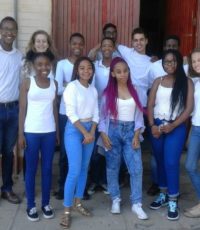
The Nteta Singers, the acappella group that Kevin Nigarura (2016-17 Fellow with Maru-a-Pula in Botswana) and Julia have been helping with during their fellowship.
As my 10th month of teaching is coming to a close, I think I might have finally hit my stride. It’s been quite the journey to reach the point where I am fully comfortable teaching my classes: it took time for me to get to know my students, for them to get to know me, and for us to come to a mutually agreeable class dynamic.
Another factor, however, is that I think we are all lulled into a false sense of knowing what teaching entails because we have been surrounded by teachers our entire lives through formal education. If you haven’t actually taught before, I’d like to challenge that notion. The truth is, teaching is monumentally challenging. I’m sure it’s challenging everywhere, but I can speak most directly about my experience teaching Maths to 7th, 8th and 9th graders at Maru-a-Pula Secondary School in Gaborone, Botswana.
Imagine 25 students in a classroom all with different abilities, different interests, and different struggles at home. Add in teenage hormones, incredibly stifling heat with no fans, and temperamental aircons. Consider that here, and now, part of the mission of secondary education is to inspire students to pursue higher education and return to Botswana, or the continent at large, to make an impact in jobs and careers that may not have been created yet. This means that yes, although the topic for the day might be adding fractions, a lesson is also expected to teach creative thinking, analytical processing, and collaborative learning, and should fit together with other lessons to form a broader arc throughout the term that guides students to gradually build self-confidence, self-reliance, and independence.
Now imagine the reality of a lesson. You are checking homework and notice one boy isn’t doing a thing. When you ask why he isn’t doing the problem written on the board under the giant heading “TO DO NOW,” he asks, “Oh, mma, were we supposed to do that now?” When you attempt to create a classroom discussion, another student distracts his side of the room as he flirts with a girl by applying her bright purple chapstick to his lips. You form pair-work to collaboratively solve some problems, and a child interrupts the class to motion you over and whisper that she can’t possibly work with her partner since he clearly hasn’t showered in days and he smells rank.
You take a deep breath. 35 more minutes to go until the bell, when you will gather your papers and rush off to another classroom to teach 25 new teenagers with their own individual issues and learning styles and Maths abilities and chapstick colors.
It is true that teaching can be rewarding and joyful and a bucket load of fun, but it’s also incredibly hard. Teenagers act like teenagers everywhere, from New York City to Gaborone, and teaching them has been a delightful challenge unlike any other I have ever faced.
Notes from the Field
By Jake Poepping, 2016-17 Fellow with Baylor International Pediatric AIDS Initiative in Tanzania
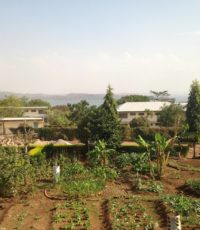
The gorgeous view from Jake’s office in Mwanza.
Armed with one semester of Kiswahili taken in my freshman year of college, I thought I was ready to go. I had been told that it was possible to succeed in my fellowship post without much Kiswahili experience, and that my coworkers would all speak English. “Hakuna matata,” I thought. I’ll be fine.
Surprised was I when I found myself counting ceiling tiles during hour-long meetings conducted exclusively in Kiswahili, twiddling my thumbs when I should’ve been facilitating educational activities for HIV+ teens, and nearly hyperventilating when the Executive Director asked me how my day was in Kiswahili. I noticed myself awkwardly avoiding eye contact and conversation with people in town, as I knew it would probably lead to an uncomfortable, tongue-tied, sweaty Kiswahili response equivalent to “Ha, um, I dunno, bye.” Very few people in Mwanza speak English, and while I initially saw this as an obstacle, it soon became the catalyst for what I consider to be my largest achievement this year.
When I realized how much work I had to do, I hit the books. I initiated conversations with everyone I passed as walked to work every morning. I encouraged my coworkers to speak with me in Kiswahili. I signed up for every ‘Swahili Word of the Day’ email listserv I could find. It took a lot of work, but every successful interaction kept me going. I found that Kiswahili is a fun and relatively easy language to learn, with a few exceptions (say ‘kipikikusikitishacho’ 5 times fast).
What once made me a hermit now motivates me to get lost running in the villages in Mwanza and grab chapati with random mamas along the way. I can now take a more active role at work and get to know Baylor’s clients, their struggles, and their triumphs. I spend hours joking with the guys at the chipsi mayai stand across the street, I play checkers with a shoemaker down the road, and I can successfully argue my way out of visa scams at the Tanzania-Kenya border. I know people in my community now. When I walk down the street in my neighborhood, the kids don’t shout ‘MZUNGU’ (white person) anymore, they shout ‘JAKOBO!’
Learning Kiswahili has substantially improved my quality of life and the quality of my relationships. It has sparked debate, humor, trust, empathy, comfort, and productive discomfort. Though I’m not staying in Tanzania next year, I plan on bringing my passion of learning the local language with me wherever I go, and I feel so lucky to have been placed in a city and with an organization that has allowed me this kind of growth.
Notes from the Field
By Shayla Reid, 2016-17 Fellow with Young 1ove in Botswana
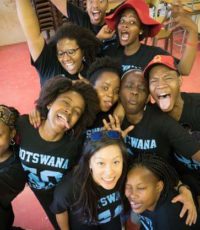
Shayla (back left) and her colleagues taking a silly picture after an outreach event at a local primary school.
There’s a running joke in my office about being “taught at the right level”— if we are in a meeting and someone isn’t quite following along, they might say “Please, I need to be taught at the right level. I’m at beginner level, but I’m hoping you can take me to the next level.” All this talk of levels and teaching is because of Young 1ove’s exploration of a program called Teaching at the Right Level (TaRL). TaRL focuses on remedial education. The goal of the program is to assess the basic literacy and numeracy skills of primary school students who are at the equivalent of what is grade 4 in the US. After students complete a simple assessment to determine their skill level, the program then provides an intervention designed to help them remediate to the level they should be at for their age and grade.
In August, TaRL was introduced as a potential new program for the organization to take on, and since then, we’ve been making a lot of progress on the specifics of what the program may look like. We are still very much in the beginning stages, but the excitement of a new program is propelling us forward. TaRL is also a venture into a different area than what Young 1ove has focused on previously— we have expanded our focus to education, and not just youth health. It’s been exciting to see the organization grow, even within the short time period I’ve been a part of it. It’s quite a privilege to be part of a small and relatively young organization (we just celebrated our third birthday in March!) and to witness the ins and outs of program design and implementation. While I’ll only be at Young 1ove during the design stage, I still am able to partake in and learn from these early conversations of what implementation could possibly look like.
Understanding the complexity of program design has been the highlight of my professional experience here. After my fellowship, I will start medical school and my exposure to program design and implementation will serve me well as a future physician. These opportunities have allowed me to further reflect on how I will incorporate public health and advocacy into my career. I look forward to the continuing conversations around TaRL within my office, and especially to how I apply those concepts in my future.
Notes from the Field
By Stuart Russell, 2016-17 Fellow with Population Services International in Senegal
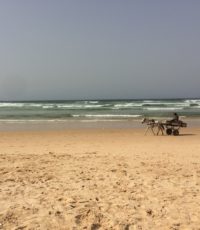
One of Dakar’s many horse drawn chariots rattling alongside the surf Yoff Plage in Dakar.
Dakar is a bustling metropolis of more than three million people. International institutions and NGOs ranging from UNICEF to the Open Society Foundations have offices here. Embassies are around every corner and toubabs (the Wolof word for Westerners) are a common sight. Not only is Dakar the economic and political heart of Senegal, but it is also an international and cosmopolitan city.
However, for such a large urban area, Dakar often feels strangely small, almost like a Senegalese village. Taxis zip around cattle herders moving their flock across some of Dakar’s busiest roads. Horse-drawn chariots transport onions and potatoes through streets that are otherwise too narrow or too sandy for proper trucks. During the weeks preceding Tabaski, one of the most important holidays in the Muslim calendar, the city resembles a farm as every spare space is filled with sheep being bought and sold for the holiday feast. Indeed, sometimes Dakar is a large city, but sometimes Dakar is a small village.
Dakar’s small-town feel is perhaps most evident when I return back to my neighborhood after traveling. I have been fortunate enough to travel frequently during my fellowship year, both for pleasure and for my work at Population Service International. After every trip, I’m consistently amazed at how excited my neighbors are to see me return home. Each of the characters in my neighborhood always welcomes me warmly and the sincerity with which they inquire about my travels never ceases to impress me.
There is the vegetable seller who gives me a big high-five and asks me how my parents and girlfriend are doing, even though she’s met neither. There is the young girl who plays on my street and encourages me to practice my Wolof. There is the boutique vendor from whom I buy my eggs who greets me with a big smile and waves energetically as I pass. There is the guard next door with whom I often share a café touba, Senegal’s unique spiced coffee drink. And there is the man who reads his newspaper every day in front of the Cape Verdean embassy and shouts “Allez, jeune homme!” as I go by on my morning run.
All of these people, some who I know very well and some who are more foreign, make Dakar feel warm and friendly. They – just as much as the cattle and sheep wandering Dakar’s streets – transform the large, intimidating metropolis into a sort of village that I’m now proud to call home.
Notes from the Field
By MK Speth, 2016-17 Fellow with The Rwanda School Project in Rwanda
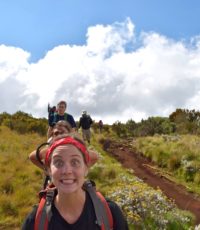
MK smiling through the pain on day 2 of Kilimanjaro.
“What does Burp mean?”
I spell the word out on the blackboard in large letters for the group of 25 secondary students to see and attempt to answer the question at hand. I explain that a burp is when air that has built up in your stomach releases causing a noise to come out of your mouth. I receive several quizzical looks, so I try my best to take a large gulp of air and release the best burp-sound possible. The rather pathetic noise I make is met with a chorus of Ohhhhhs and a spattering of giggles, which I interpret as success.
While I do not regularly burp in response to questions, answering English vocabulary questions is an essential part of the after-school program I coordinate at Rwamagana Lutheran School (RLS) called WASP (or Amavubi in Kinywarwanda). WASP, otherwise known as the Weekly Accelerated Study Program, is a university preparation course that targets select high-achieving A-Level students. The course aims to enhance students’ core academic skills while also providing critical information and advice on universities, application processes, scholarships, and general career planning.
Nine months ago when I started my fellowship with the Rwanda School Project, the role of WASP Coordinator and ad-hoc University & Career Advisor absolutely terrified me. What did I, a recent graduate from a tiny liberal arts school in Pennsylvania who is still trying to figure out her own career, know about university and career planning, let alone in an East African context?
This fear not only caused a constant feeling of ineptitude, but it also completely stifled my creativity and passion in the classroom for the first month. My WASP sessions were, for a lack of a better word, boring. I could tell my students sensed my lack of self-assurance, which led to a wary and disinterested attitude towards WASP and other career & college planning sessions.
After a particularly bad WASP session (note: playing Bingo with a group of students who have never heard of it before is not a good idea) I realized that if I wanted to be effective in my role, I would desperately need to regroup and refocus. I decided to make a conscious effort to stop questioning my qualifications and instead approach my responsibilities with the same fake-it-till-you-make-it confidence and carefree attitude that I try to instill in my students.
Now, with only three months of my fellowship left, I can happily say that I have fallen in love with my role as University & Career Advisor. Unlike my other responsibilities at RLS, this role allows me to work closely with students on a daily basis while also forcing my creativity to its brink due to continuously having to come up with inventive and enticing lesson plans for WASP. Although I may not have an answer to every question, I know that I can at least do my small part in motivating and supporting my students as they work towards their dreams (especially when it involves burping).
Notes from the Field
By Nika Soon-Shiong, 2016-17 Fellow with Equal Education in South Africa
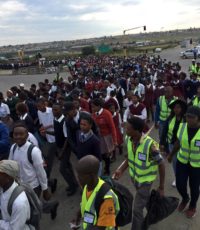
Learners in the Eastern Cape March to the Eastern Cape Department of Education in Zwelitsha to Prioritise South Africa’s Forgotten Schools.
At 6:30 AM I woke up and threw on my favorite Equal Education (EE) t-shirt, which reads Uncaptured and Unafraid, the theme of our annual political education camp for high schoolers across the country. I picked up the EE spokesperson from her bed and breakfast, and we ran through the social media strategy for the day’s big event –a march to the Eastern Cape Department of Education. Our next stop was to fetch journalists from GroundUp, City Press, and, finally, some breakfast. I triple-checked my backpack for my camera, copies of the Memorandum, and extra prints of “Planning to Fail: A Report on Equal Education School Visits November 2016.”
The report has been my big research project since last November, and to carry it around for it to be presented to government officials by 2,000 activists felt a bit like I was marching to my thesis presentation or the birth of my first child. Upon arrival we were met by ten busses full of learners singing struggle songs in school uniforms. The night before, I had worked late with two Grade 11s on their speeches, which called for the Department of Education to fix dilapidated structures in their schools.
Planning to Fail illustrates the abysmal state of school infrastructure in the Eastern Cape. For two weeks, teams of Equal Education staff surveyed 60 schools in 7 different school districts. The report contextualizes our shocking and saddening findings within the history of underdevelopment of Eastern Cape Education and the political dynamics which prevent effective service delivery.
Working at Equal Education has re-invented my understanding of research and its role in society. Being the Eastern Cape researcher for an activist movement has taught me how research outputs need to be living texts in order for them to effect change and evoke action on the ground. Reports are to be sung on the streets with thousands, blared from the radio, recounted on television screens, read in seminars and youth groups, and returned again and again to community members. In this case, those members were the principals, teachers, and learners whose lived experiences helped us to paint a clear narrative: the education system in the Eastern Cape reveals a lack of a capable state.
Planning to Fail was delivered to Community Liaison Officer Monde Sangqu on 27 April 2017, and will continue to be a tool for the organisation until it succeeds in its mission to build schools and hold government officials to account. The same dynamism that is required of this information is often required of me –to shape-shift based on the needs of the movement. I am a researcher, but I am also a driver, curriculum developer, speechwriter, social media officer, chef, facilitator, marshal, and travel agent. Above all, I am a student of my new context and the brilliant activists who have patiently given me the space to stumble and to grow.
Notes from the Field
Alumni Update: Emily Moder, 2013-14 Fellow with access:energy in Kenya
By Harrison Leaf, CEO & Co-Founder of SteamaCo.
At SteamaCo, we have experienced first-hand the benefits of serendipity in recruiting, and Princeton in Africa played an important role in this process. PiAf gives passionate individuals an opportunity to break into Africa’s development sector. Many PiAf posts have stories of Fellows who make contributions beyond expectations. Emily Moder is a notable example of this pattern, having progressed from Fellow to executive over the past 4 years.
Emily joined SteamaCo as a Princeton in Africa Fellow in 2013. In those days the company was known as access:energy, a Kenyan startup that manufactured and installed wind turbines in rural areas. In her first months on the team, Emily wrote the early iterations of our smart metering software at an equatorial picnic table surrounded by chickens and welders at our office in Kisumu. Emily has been a core contributor since she joined us, and we offered her a full-time position as Software Manager after her fellowship.
Access:energy moved its headquarters to Nairobi and became SteamaCo, a technology company that operates remote utilities through our smart metering platform. Emily became our VP of Software, managing – to our knowledge – Nairobi’s only all-female software engineering team.
During her four years with the company, Emily has constantly raised the bar – for herself and those around her – on motivation, resourcefulness and ability. Along with the company’s evolution, Emily evolved from software development to project managing the deployment of ten micro-grids across Kenya, handling issues that ranged from smart meter connectivity to financial reporting to fortifying solar equipment against destructive herds of zebra. With 42 mini grids in 9 countries on three continents now under her belt, Emily is now a member of SteamaCo’s senior management. We’re proud to have her as Operations Director, in charge of supply chain and smart meter deployments. Emily is a continuing success story that any organisation would be glad to tell.



